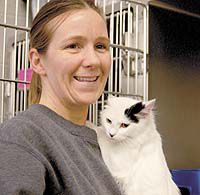| Rebecca Gallucci of the Carbon County Animal Shelter removes a homeless cat from a cage in preparation for daily cleaning. Gallucci and all members of the shelter working at the shelter focus making certain that the animals housed at the county facility have a clean living environment. |
The Carbon County Animal Shelter saved more than 1,040 dogs and cats during the last year. And shelter director Dorreen McCourt is proud of the accomplishment.
With Senate Bill 190 in front of the Utah Legislature, many state residents are doing everything possible to ensure that animals are treated fairly.
SB 190, which was proposed by animal lovers in conjunction with the Utah Humane Society, would make it a felony to knowingly torture an animal.
“We love each and every animal that comes into this place,” stated McCourt. “It is our hope that every one of them can find a loving, caring home.”
Statistics provided by the animal shelter showed that the Carbon County facility took in 1,735 cats and dogs in 2006. Of those, 736 were adopted, 308 were redeemed and 624 had to be put down as a final option.
“Adoption of a animal from the shelter is a wonderful way to bring a new pet into the home,” said McCourt.
The county charges an adoption fee of $70 for dogs and $40 for cats which includes the cost of spaying and neutering as well as micro-chip implementation.
While not having a home can be a big problem for cats and dogs, an inhumane owner can be worse. The Utah Humane Society is trying to make the torture of animals a much more serious offense.
According to the organization’s Web site, the society scheduled a press conference for Feb. 27 to rally final support for SB 190 which is known as “Henry’s Bill.” This bill makes the intentional torture of an animal – like the recent case of Henry, the dog who was reportedly put in a hot oven for five minutes – a third degree felony.
Henry has recovered from the injuries and the dog was present at the state press conference.
Officials of the Humane Society of Utah indicate that they are anxious to get the bill made into law in 2007.
The organization unsuccessfully sponsored the proposed legislation for the past three years.
Previously, the proposed legislation has been opposed by some rural lawmakers who fear that such action might hamper the rights of groups like ranchers or rodeo promoters, stated the Utah Humane Society press release.
HSU executive director Gene Bairschmidt emphasized that the legislation is specifically written to exempt such activities.
The society’s director credits the provision with the bill’s successful passage in the senate on Feb. 23.
“The bill does not limit any activities traditionally associated with people’s lifestyles or livelihood, like ranching or rodeo,” explained Bairschmidt. “It does not place penalties on animal torturers that are equivalent to those imposed on people who abuse other people. It does not apply to minor offenses or unintentional minor acts like forgetting to feed a pet for a day and it does not establish an unusual or unprecedented standard.”
“Forty-two other states and the District of Columbia already have felony provisions in their animal cruelty statutes,” continued the organization’s director.
On Feb. 27, the conference stressed the importance of passing SB 190 to the entire state.
But despite efforts to promote the legislative proposal, SB 190 was awaiting a Utah House of Representatives vote on Wednesday afternoon when the Sun Advocate went to press.
“There is an overwhelming body of scientific evidence linking the torture of animals to violence against other human beings. The statistics speak for themselves,” pointed out Bairschmidt.
“Almost half of United States prison inmates convicted of rape and sexual homicide reported histories of animal abuse and an almost unbelievable 89 percent of serial murderers repeated that same patterns. An equally high percentage of animal abuse occurred in homes where child abuse also took place,” continued the Utah Humane Society director.
“Dogs and cats enrich our lives by providing unconditional love, stability and loyalty. It is only right that we should protect them from mindless torture,” concluded Bairschmidt.
The state organization’s sentiments were echoed by the workers at the county’s animal shelter south of Price.
“Some animals bounce back from horrible situations to make great pets but some just never really get over what has happened to them,” said Carbon County Animal Shelter technician Rebecca Gallucci.
The county shelter intends to continue to care for animals without homes locally.
And according to the shelter’s director, discussions are currently in the works to expand the facility with the help of the Carbon County Commission.
“We really appreciate the support of the commission, they make it possible for us to do what we love,” concluded McCourt.

